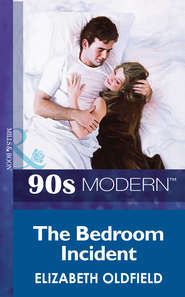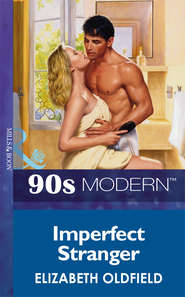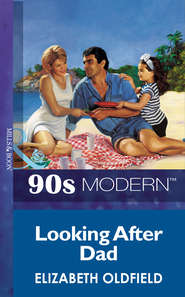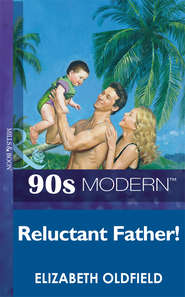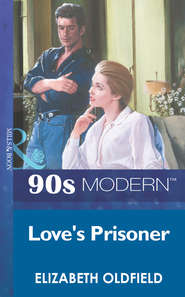По всем вопросам обращайтесь на: info@litportal.ru
(©) 2003-2024.
✖
Fast And Loose
Автор
Год написания книги
2018
Настройки чтения
Размер шрифта
Высота строк
Поля
‘Louse,’ she muttered.
‘Are you referring to Maurice or to me?’ Keir enquired from across the table.
She looked at him. She had not realised that she had spoken out loud. ‘Maurice,’ she said, though thinking that he qualified for the description too. ‘He’s not to be trusted. He’s always been a tricksy individual and he always will be.’
‘Then why keep him on as your agent?’
Darcy had wondered about that herself. She had also mulled over the irony of someone who was not very good at show business and certainly not as ambitious as one was meant to be being represented by a pushy wheeler-dealer like Maurice.
‘Because he has an impeccable instinct for identifying good parts,’ she replied, which was true—most of the time.
Keir’s blue eyes held hers in a level look. ‘You also keep him on because his father used to be your father’s agent.’
Darcy stiffened. She did not want to talk about her father—not with him. No, thank you. It was a no-go area, sacred ground where Keir, as the infidel, had no right to trespass. Where he was banned. But hadn’t his comment been a condemnation?
‘So I’m carrying on a family tradition. There’s nothing wrong with that,’ she said defensively.
‘But there is something wrong with Maurice keeping stumm about Bill Shapiro and not telling you of this evening’s arrangements,’ he remarked, and lifted his glass to his lips.
As he sampled his gin and tonic his eyes took a journey over her. Starting at the top of her burnished sable-brown head, they toured her face—the high cheekbones, almond-shaped green eyes, full, crushed-strawberry mouth—fell to linger for a moment on the pout of her breasts, swept lower over her body to her hips and went down the length of her legs until the low table masked any further view.
He lifted his gaze. ‘You’ve grown up,’ he said.
Darcy bridled. His look had been a leisurely and detailed inspection. She felt as if he had removed every stitch of her clothing, piece by lazily tossed-aside piece, and surveyed her naked. Stark naked.
‘People do,’ she retorted. ‘I was eighteen when we last met, whereas now I’m——’
‘A sophisticated twenty-five,’ he said.
Because Maurice had told her on the telephone to ‘dress in your best’ Darcy was wearing a slim-skirted black linen suit with a spaghetti-strapped coffee-coloured lace camisole. She had also made up her face with unusual care—bronze eyeshadow, sooty mascara, the works—and had shampooed her hair which swung in silky sable-brown curls around her shoulders.
She knew she was looking good and, although she told herself that she did not give a fig about whatever Keir Robards might say, it was impossible to prevent a glow of feminine pleasure.
‘Thanks,’ she said curtly.
Keir’s eyes fell again. ‘Who still has the most tempting curves,’ he added.
Sophisticated or not, Darcy flushed scarlet. His comment held a wealth of meaning, for when she had visited his room at the Brierly all those years ago the dress she had worn had been daringly low-cut and, as she had hoped and intended, Keir had been fascinated by the honeyed swell of her breasts.
Darcy fought an urge to yank her jacket across her chest and fasten each and every button. All of a sudden her camisole seemed woefully revealing, and from the continued dip of his gaze he appeared to be fascinated by her lace-covered bosom now.
‘Couldn’t the play be postponed until Mr Shapiro is well again?’ she enquired, in a determined and rather desperate switch of subject.
Calmly raising his eyes to hers, Keir shook his head. ‘It’d mean too much upheaval for too many people, you must realise that. And if the theatre slots went it might take a year before they could be replaced.’ He dragged a hand through the spikes of tawny hair which persisted in falling across his brow, raking them back. ‘You haven’t worked with either Bill Shapiro before or with me, so what makes you prefer him?’
She shot him a startled look. Didn’t he know? He had to. He must. It was neon-lit to her. But of course Keir might consider the events of the past to be of little consequence.
While his regarding her piece of lunacy as insignificant would be an enormous relief—perhaps his reference to her curves had been random and the bedroom incident had faded from his mind?—that he could be indifferent to what had happened with her father—to her father—made her burn with raw resentment. How callous. How cruel. Yet she supposed it was possible. One person’s catastrophe could be another person’s hiccup, and everything had happened a long time ago.
Darcy took a sip of sparkling water. His question had sounded rational and reasonable so she would answer in a similar manner; but what did she say?
‘I prefer Mr Shapiro,’ she began, ‘because, well, for a while now I’ve had it fixed in my head that he’d be directing, and I’ve become used to the idea. And I liked it. And when we spoke on the phone he seemed a pleasant individual. And…’ Aware of waffling, Darcy heard her voice fade away.
‘And you’ve never lusted after him,’ Keir completed.
To her fury, she felt her cheeks start to burn again. He had not forgotten what had been the most embarrassing incident in her entire life. Damn it. Damn him. But he need not think that she would be covered in girlish confusion this time.
Darcy had once acted the role of Cleopatra at stage school and now she eyed him with icy and regal disdain. ‘I’ve never lusted after you,’ she declared.
A smile played around the corners of his mouth. ‘No kidding?’
‘I had a crush, that was all. A mild, innocent schoolgirl crush, which lasted for an extremely short time.’
‘And your innocence lasted for an extremely short time after that because you became a hot item with the young Lothario Gideon McCall.’
At his mention of the actor whom she had once dated, Darcy frowned. The distaste in Keir’s tone indicated that he could be recalling how, on the expiry of their romance, Gideon had spoken about it to the Press. Her frown deepened. If Keir did not approve of Gideon’s lurid and elaborately fabricated kiss-and-tell which had been pounced on by the tabloid newspapers, neither did she; though it had served one useful purpose.
‘Gideon was a humanoid calamity, but regrettably when I was younger——’ she shone a cheesy smile ‘—I did not have such great taste in men.’
‘Ouch,’ Keir murmured.
‘However, now I’m far more discerning.’
He lifted a brow. ‘Heaven be praised for maturity. So why are you reluctant to work with me?’ Keir asked, returning to his earlier enquiry.
Having stalwartly denied her first reason, Darcy was left with the second. But by the time the so-called ‘artistic differences’ with her father had occurred she had been avoiding Keir Robards like the plague so he had not been aware of her feelings, her conclusions, nor of the blame which she had later apportioned.
She bit deep into her lip. She balked at revealing any of this now, balked at reviving hurtful memories which could, if she threw caution to the winds, lead to the flinging of a dramatic indictment. What was the point? Her much loved father was dead. Nothing could be changed.
‘You’re afraid that as I’ve not directed since— when?—last fall I might be rusty?’ he said, when she remained silent.
As he had hesitated Keir had brushed his fingertips across his mouth in thought and drawn her gaze. He had a thin upper lip and a fuller, sensual lower one. Once she had spent hours fantasising about those lips, that mouth—how it would feel when he kissed her, how after much delirious kissing, when her own mouth was softly bruised and tender, his would move slowly and tantalisingly down her naked body; how his lips would brush across the peaks of her aching nipples, how he would open his mouth and——
Darcy dragged her eyes away. What was she thinking?
‘Correct,’ she declared, grabbing gratefully, if untruthfully, at his suggestion.
While she never sought out information about Keir Robards it was impossible to avoid the occasional newspaper paragraph or comment made by a colleague within the theatre. So she knew that he would accept a directing assignment—sometimes a stage play, sometimes a film but, during the past seven years, never again in England—then vanish from public view for perhaps several months before he became involved in the next. What he did in between times was a mystery.
‘I often have gaps and yet—touch wood——’ Keir leaned forward to press long, blunt-tipped fingers to the table ‘—so far I’ve managed to do a good job. I intend to do a good job this time.’
And never mind any damage you might inflict on others, Darcy thought bitterly.
Pushing back his cuff, he checked the vintage Rolex watch which was strapped to his broad wrist. ‘It’s eight-thirty,’ he said. ‘Why don’t we find our table and carry on talking in the restaurant?’
Darcy clenched her fists, the fingernails biting into her palms. She did not want to dine with him. No, no, no. What she wanted to do was deliver a series of ringing slaps to his freshly shaven jaw, spin on her heel and march out; but that would be a big mistake.
Although Keir might direct intermittently, he possessed considerable status, and if she antagonised him too much it could rebound and damage her career. People in the business would notice her withdrawal from the play and ask questions, and all it would need would be a comment from him about Darcy Weston being unreliable or frivolous or plain contrary and other directors might think twice about employing her, regardless of her talent and unblemished track record.






